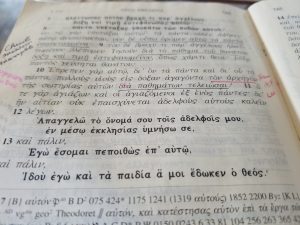Inerrancy and Liberal-Conservative Dialogue
In a comment at , Adrian Warnock says the following:
Dr Grudem has expressed regret for the use of the word “blasphemy”, and as far as the quote from his systematic theology goes you have to understand that his aim is explicitly to build a theology based on the assumption that the bible is inerrant – I am not too sure how you think a liberal theology would help in that aim…
(See also Dr. Grudem’s retraction of his agreement to the use of the word blasphemy.)
This comment made me pause for a bit, because I do, in fact, carry on quite successful dialogue with various people who believe in Biblical inerrancy, and I was wondering how it could be as hard as Adrian is indicating. In fact, I edited and publish a book by Elgin Hushbeck, Jr. who believes in inerrancy, and he and I have had many excellent dialogues on that subject and others.
But as I have looked at this entire series of interviews with Wayne Grudem that has sparked so much discussion, I’ve noted repeatedly that it’s not just the doctrine itself, but the placement in one’s general doctrinal picture that is so important. For Dr. Grudem, that is not surprising, considering he has written so much on systematic theology. I don’t think that way, so I don’t notice the relationships as easily.
I would note however, that while I disagree with the idea of male-only church leadership, I am not particularly offended by churches that follow such a practice. Anyone who dislikes their view can go find another church, and there are plenty of those. What I object to is that this doctrine is made an essential of the faith. In addition, male leadership is linked to inerrancy which is again seen as an essential of the faith, and as Adrian’s comment indicates, it is an essential that is not to be questioned, at least from outside.
On penal substitutionary atonement the process is interesting. I’ve had some of these conversations. Do I believe that Jesus died for my sins? Yes. Do I believe in substitutionary atonement? Well, substitution describes a substantial part of the atonement. But do I believe in penal substitutionary atonement? I believe that penal substitution is one expression of the atonement. I do not believe it is the expression of it. And there the exchange will end.
Now I know that Dr. Grudem retracted his acceptance of the term “blasphemy” when used of Steve Chalke (with whom I am not acquainted). I’m a little less happy with that retraction than others are. Don’t get me wrong here please. I appreciate the humility and the willingness to dialogue that it represents. But I wonder if at root there isn’t some justification for the word form Dr. Grudem’s point of view on the atonement. Now I can’t speak for him, but what suggests this to me is my own reaction from the other side. The claim that penal substitutionary atonement is the essence of the atonement tempts me to use the word blasphemy because I believe it paints such a wrong picture of God, one different from the revealed and experienced God. Now I’m also going to resist use of the term, though my own use of anti-God could easily be as provocative. Thus I understand both John Piper’s desire to use the term, and Wayne Grudem’s initial agreement.
My concern is that we dim the importance of these issues in a desire to promote dialogue on them. How can we truly dialogue if we don’t make it clear what we truly believe? I face this when I express tolerance. The assumption is that, as either a self-proclaimed moderate or as a liberal in the estimation of many, I don’t care as much about these doctrines as do conservatives. That is incorrect. When someone teaches a doctrine that looks to me like “divine child abuse,” a doctrine I consider wrong, I do have an emotional response to what I see as an attack on God. I think perhaps we got the best of all possible worlds in seeing Dr. Grudem react on the spur of the moment, and then display the humility to back off of what he saw, on second thought, as excessive vocabulary.
Coming full circle to Adrian’s quote, however, I think that the issue would simply be this: Is inerrancy an unquestionable foundation, an assumption of conservative theology? If so, then discussion is truly going to be limited. It seems to me that with the Bible in front of us, inerrancy is an issue that can be debated. But there are fundamental points in theology from which everything else works. For me, it is the incarnation. I can dialogue with almost anyone, I think, but I won’t think I’m doing Christian theology if that dialogue is with someone who doesn’t accept “the word was made flesh and dwelt among us (John 1:14)” or “God was in Christ reconciling the world to himself (2 Corinthians 5:19).”
Nonetheless even there, I have come slowly to the point of tying my doctrine generally into that one central doctrine, and my view of ritual into the eucharist. That didn’t happen by magic or at one time. Using that knowledge, I still find myself able to dialogue, and I find the challenge of someone who doesn’t see the core the same way I do as a valuable thing. I’ve given other reasons, but again this would be sufficient reason for me to follow and respond to Adrian’s interview with Dr. Wayne Grudem, even though I suspect I have the least theological connection of any of the bloggers who have.
I thank Adrian for his presentation and I’m going to continue to link to and respond to it. I see part 8 is out, and I’ll have to read it later to day and then comment.


You write that according to Adrian “inerrancy … is an essential that is not to be questioned, at least from outside“. But it seems to me that for these people it cannot be questioned from inside either, because if someone who does believe in some kind of inerrancy questions the interpretation of it and its consequences generally accepted on Adrian’s blog, they are immediately assumed to have rejected inerrancy and so to be on the outside.
It is interesting to read that you are “tying [your] doctrine generally into that one central doctrine“. I wonder what the central doctrine is into which others are tying their doctrine generally? Perhaps for some it is the inerrancy of Scripture. But actually I wonder if for Dr Grudem the central doctrine into which everything else must be tied is the headship of man over woman. Yes, seriously, he seems to put this at the base of his whole theological system, but, as the opening chapter of Recovering Biblical Manhood and Womenhood (written by John Piper, but Grudem was his co-author) clearly shows, he in fact bases this doctrine not on Scripture but on prejudices acquired from upbringing in a conservative home.
Henry, thanks for your reply, and sorry to be slow looking at it.
You may be right with your “best possible construction” of Grudem’s words, but I seem to be able to trace his understanding back to cultural issues and misunderstandings of older Bible translations which have little to do with inerrancy.
As for Adrian’s commenter (the link is broken, as I have previously told Adrian about his comment links), I have already said to Adrian that if he really wants to be consistent about disrespectful links, he should control that particular commenter, and make it very clear that his policy is applied even-handedly to those he agrees with and those he does not.